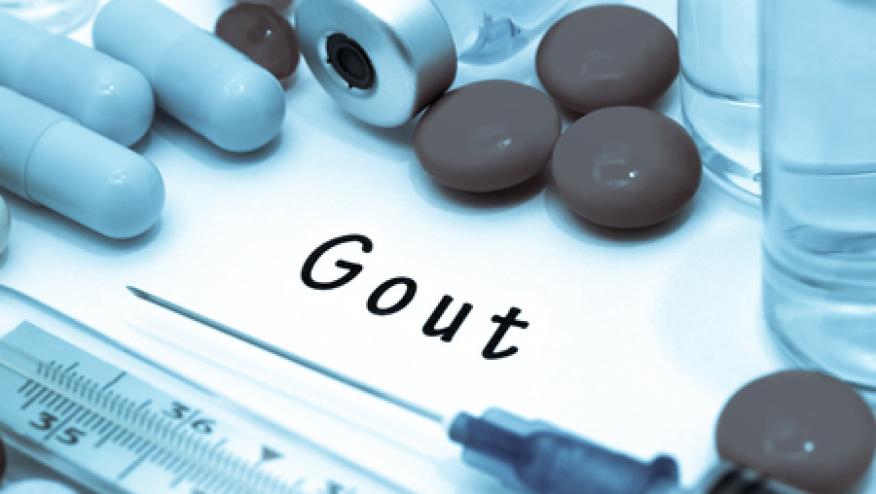Does Dose Escalation Help in Gout? Save

Contrary to expectations, dose escalation of allopurinol among patients with gout did not improve survival, a 10-year observational study found.
Among patients who increased their allopurinol dose during the first 2 years of treatment, there was actually a small 8% increase in all-cause mortality (HR 1.08, 95% CI 1.01 to 1.17), whereas the investigators had hypothesized that escalation would lower mortality, according to Ted R. Mikuls, MD, and colleagues from the University of Nebraska Medical Center in Omaha.
Similar effect sizes (though not statistically significant) were seen for cardiovascular mortality among dose escalators (HR 1.08, 95% CI 0.97 to 1.21) and for cancer mortality (HR 1.06, 95% CI 0.88 to 1.27), the researchers reported online in Arthritis & Rheumatology.
However, patients who had dose increases "were only rarely escalated to levels typically required for proper gout control. Such 'clinical inertia'widespread clinical inertia seen in this and other studies of gout -- defined as failure to intensify treatment when indicated."
Gout is the most common form of inflammatory arthritis, affecting about 4% of the U.S. population. "What's notable about gout is that it keeps bad company -- in the form of co-morbid illnesses, especially cardiovascular disease," Mikuls told MedPage Today.
Elevated uric acid and gout have been linked with increased mortality, and studies have shown that the use of allopurinol may lower mortality by up to 20% among individuals with hyperuricemia. But it has increasingly been recognized that the majority of gout patients do not achieve the target goal of serum urate below 6 mg/dL as recommended in current guidelines.
One study, for example, found that many primary care physicians, who manage 95% of gout patients, do not routinely escalate allopurinol doses. There are many reasons for this, Mikuls said. "Many of these patients suffer from a lot of co-morbid conditions, and that takes away time from this in the clinic."
It therefore remains unclear whether there is a relationship between allopurinol dose and mortality.
To address this question, Mikuls and colleagues analyzed data including demographics, co-morbidities, and prescriptions from the Veterans Health Administration database for patients initiating urate-lowering therapy from 2001 to 2008, identifying 7,336 dose escalators and 18,042 non-escalators.
Propensity score matching was used to mitigate baseline confounders and prognostic variables between escalators and non-escalators. The dose-escalation period was the first 2 years after initiation. Patients were allowed to switch to febuxostat (Uloric) following that drug's approval in 2009, but few did so.
Patients' mean age was 64, more than 70% were white, and almost all were men. Co-morbidities included hypertension in 90% of patients, cardiovascular disease in 50%, and diabetes in 38%.
Among the dose escalators, body mass index was higher (32.6 versus 31.9), baseline serum urate was slightly higher (9.7 versus 9.4 mg/dL), and there was greater use of colchicine (62% versus 54%). Dose-escalator patients also had a lower starting dose of allopurinol (100 versus 200 mg/day), and more often were given their initial allopurinol prescription by a rheumatologist (18% versus 7%). Escalators also showed greater adherence to their medication.
A minority of patients reached the target serum urate goal of less than 6 mg/dL -- just 31% of dose escalators and 12% of non-escalators.
During the mean follow-up of 5.6 years among dose escalators, there were 1,384 deaths from any cause, while during 5.5 years of follow-up among non-escalators, there were 1,483 deaths, for all-cause mortality rates of 42.5 and 38.7 deaths per 1,000 patient-years, respectively.
For cardiovascular deaths, there were 644 among escalators and 694 among non-escalators, giving cardiovascular mortality rates of 19.8 and 18.1 per 1,000 patient-years, respectively. For cancer, there were 223 and 240 deaths, with cancer mortality rates of 6.8 and 6.3 per 1,000.
"In this study, there was no compelling evidence to suggest that allopurinol dose escalation is associated with meaningful reductions in mortality risk among gout sufferers," the researchers wrote.
However, in a sensitivity analysis that was limited to 2,000 escalators who achieved the serum urate target below 6 mg/dL and their matched non-escalators, there was a 7% decline in cardiovascular mortality (HR 0.93, 95% CI 0.76 to 1.14).
Mikuls et al also emphasized the importance of the widespread clinical inertia seen in this and other studies of gout -- defined as failure to intensify treatment when indicated. No more than 10% of escalators ever had daily dosages above 300 mg, and only 4% exceeded 600 mg/day. The maximum daily dose is 800 mg.
"While we had anticipated that the results from this study would add to the evidence that appropriate dose escalation yielded meaningful 'extra-articular' benefits for gout patients, clinical inertia in this population was so prevalent even among those receiving dose escalation that we were unable to make a definitive assessment," the team wrote.
"My take-home from this," Mikuls said in the interview, "was that the way we currently use allopurinol in real-life practice, which I would say is not optimal, doesn't really allow us to ask the question [as to whether dose escalation improves survival] as well as we'd like. This is somewhat disappointing, but it's where we're at."
"I think we're going to need studies where we really ramp up therapy appropriately over long periods of time to address this."
Limitations of the study, the researchers said, were its observational design and inclusion of only Veterans Affairs patients.
The study was funded by a Rheumatology Research Foundation Health Professional Research Preceptorship, a University of Nebraska Medical Center Graduate Fellowship Grant, and the Nebraska Arthritis Outcomes Research Center.










If you are a health practitioner, you may Login/Register to comment.
Due to the nature of these comment forums, only health practitioners are allowed to comment at this time.